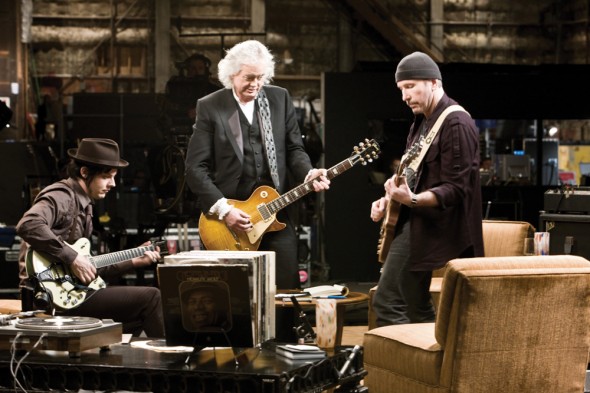
Davis Guggenheim and Three Generations of Rock
Documentarian Davis Guggenheim gives a brief history of the electric guitar, as explored through the eyes of three rock goliaths in his latest feature film. To the careless observer, It Might Get Loud bears some of the ostensible trappings of what we’ve come to know as the “rockumentary.” Simply described, it is a film about the electric guitar, told through the songs, narration, and personal stories of three musicians: Jack White, U2’s The Edge, and Jimmy Page, whose respective talent reflects their salient cultural impact.
Movies of this ilk, especially those about the mythology of rock music, are commonly framed with references to ample success, wealth accrued, and, in turn, a tragic, drug-addled dénouement to an artist’s career. The soundtrack typically spanning from the rib-rattling reverb of a guitar chord, to the wistful strains of a tragic violin tune; with some Spinal Tap-esque follies along the way.
Conversely, It Might Get Loud dispenses with the flash and veneer that you might find on an episode of “Behind the Music,” and deliberately so. Director Davis Guggenheim, whose Oscar-winning An Inconvenient Truth was heralded for transforming the slideshow presentation of Al Gore into a full-fledged movement, was less interested in making a movie coated in rock clichés than unraveling the humanity of his subjects.
“I had been very frustrated with the way films had been told about my favorite musicians, because I find they end up being about car crashes and overdoses and girlfriends breaking up the band, and you never penetrate,” says Guggenheim over the phone. “You never get deeper than the veneer of Rock Legends, with a capital ‘R’ and ‘L.’”
Nor did Guggenheim set out to make the cinematic equivalent of a Wikipedia entry, which explains the absence of stodgy historical facts, or a precise timeline of the instrument’s evolution. “Those films end up feeling like a list. My father used to call them ‘cafeteria films,’ where you go down the line and you get your Jello, salad, and milk, and you just stand there imparting information. I wanted to get inside the heads of these guys.”
But when the “guys” in question are a trio whose fame regularly subjects them to public scrutiny, the challenge is finding a way to get intimate without being intrusive, to have the musicians relate how they came to embrace the guitar truthfully, authentically—with or without a camera.

In the beginning, Guggenheim removed the camera from the equation, a trick learned by happenstance when he was making his award-winning opus. “With An Inconvenient Truth, the last two interviews I did with Al Gore were just me and him and a microphone, talking for hours,” he recalls. “I started this movie that way, where I did these long, sit-down interviews—sound only, each guitarist individually; with no preconceived questions or predetermined path of where the movie was going to go.” Those exchanges, divorced from the presence of a film crew, “are the movie,” says Guggenheim. “When I went back and listened to those interviews, I wasn’t really looking for information. I was looking for emotion and thoughtfulness and intimacy. I felt like if we followed that, we would have a movie that really revealed something unique.”
At a recent press conference, White described how, as one of the documentary’s main subjects, he made peace with being unabashedly confessional during interviews. For White, it was largely due to Guggenheim’s approach: “I think the idea that it wasn’t scripted made getting personal a lot easier,” White says. “I don’t know if it’s always a smart move for the artist to give everything away, but at times, you make a decision that it’s important to talk about certain things.”
These narrative musings—on the struggle of writing, the men’s connections to their anthropomorphized instruments, and the sensual power of a guitar riff—are revealing, but sometimes upstaged by the music itself. Though the two aren’t at odds, hearing the first rumbling strains of “Where the Streets Have No Name” (on archived four-tracks), for instance, followed by footage of fervid U2 fans bouncing in unison, is both visually and sonically assaulting. Is the amp mightier than the voiceover? Sometimes so.
Witness a shot of White strumming bloodied fingers across his guitar, or learning about the origins of “Sunday Bloody Sunday,” or, even better, see the men form a tri-generational jam band on camera. The latter moments, filmed in a cavernous soundstage as the camera pans around the virtual trinity of axe-men, give even Guggenheim chills.
But the most perceptible shift in Guggenheim’s interview cadence occurs when he describes a day spent recording Page perform Led Zeppelin’s “Ramble On,” an experience so powerful that he inwardly concluded: “‘I don’t need to say anything. I can just show this.’ He plays that, and when you watch it, you’ll understand everything about what makes Page so great, because in that song is this sweet, melodic beauty. Sublime beauty,” Guggenheim says with carefully-chosen diction. “And then, in a shift, if you watch carefully with the palm of his left hand, he hits that knob and he goes into this guitar riff. Within a few bars it’s back to the subtle melody. I never get tired of that.”
If there is one question that looms over the film—with predictable, related criticisms—it is: “What makes these musicians worthy of being showcased?” Guggenheim’s answer is circumspect: “It’s hard to say. I think there are a lot of guitarists who are virtuosos. Some of them are legends, but only a few are searchers. I think that’s what unites [White, The Edge, and Page]: the sense that they’re all searching.”
Searching, improvising, and always plugged in.
– Heidi Atwal

